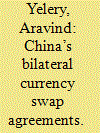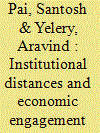| Srl | Item |
| 1 |
ID:
144796


|
|
|
|
|
| Summary/Abstract |
China has recently demonstrated diverse ways to pursue its economic internationalisation. The trade mechanism has been re-modelled without a heavy tone on exports and China’s vulnerability to import–export risks has been steadily reduced. More than trade, the investments have been pursued to make Chinese economic expansion endure. Chinese also learned the trick of larger geo-economics by not waiting for crisis to occur and get caught in the global domino effect of slowdown, recession and other impulsive nature of markets. While, on one hand, China is trying to comply by international monetary and legal standards, making more space in a cluttered room for its economic ambitions, on the other, it is also adopting smarter ways to outperform the existing heavyweight economies’ dominance in the sphere of international monetary. An example of China’s sprint for maximising its legal and economic engagement and securing benefits by having bilateral currency swap agreements (BCS), exhibits how China has evolved over the last decade. A decade back, China was apprehensive about the BCS when it did not follow the Chiang Mai initiative. The current commentary attempts to analyse China’s BCS strategy and the possible impact.
|
|
|
|
|
|
|
|
|
|
|
|
|
|
|
|
| 2 |
ID:
153120


|
|
|
|
|
| Summary/Abstract |
This article argues that bridging institutional distance is a reliable method to increase the flow of Chinese
investments into India. India’s growing economy and ability to attract investments from China meets most
of the conditions that can be considered attractive for investments from China. This is complemented by
China also fulfilling many of the criteria as a source of foreign direct investment (FDI) into India. China
is a major trading partner of India but the Indian economy remains highly deficient in Chinese investment
which undermines reciprocity in economic affairs. The possible reasons for underinvestment by Chinese
enterprises in India are partly associated with the lack of sufficient interactions between institutions of
both the countries, which in turn creates ‘institutional distances’ impacting economic affairs. This article
attempts to throw light on these issues from theoretical and behavioural perspectives. Apart from instances
of ‘institutional differences’, the article will also attempt to address how select ministries in China and
India function while dealing with each other on a case by case basis.
|
|
|
|
|
|
|
|
|
|
|
|
|
|
|
|
| 3 |
ID:
146898


|
|
|
|
|
| Summary/Abstract |
Each year, the National Development and Reform Commission (NDRC), China’s apex body to administer the financial planning and development, prepares and submits the work report to its mentor - the State Council. This year’s work report hold a peculiar significance as it was the last in the series of 12th Five Year Plan. The report highlighted the major milestones the Chinese economy achieved so far in 2015 and also discussed the future course of economic manoeuvre during the 13th Five Year plan. Although, historically as well as principally, the work reports by NDRC or its predecessor State Planning Commission and State Development Planning Commission were more ceremonial and far from self-diagnostic, there is a makeover underway especially the way the reports have been projected. The recent reports, which are tabled in the wake of economic slow-down, take reflective positions than earlier reports. However, this can be perceived as a thoughtful position by leaders and not an agent of any depressive or progressive tendencies.
|
|
|
|
|
|
|
|
|
|
|
|
|
|
|
|